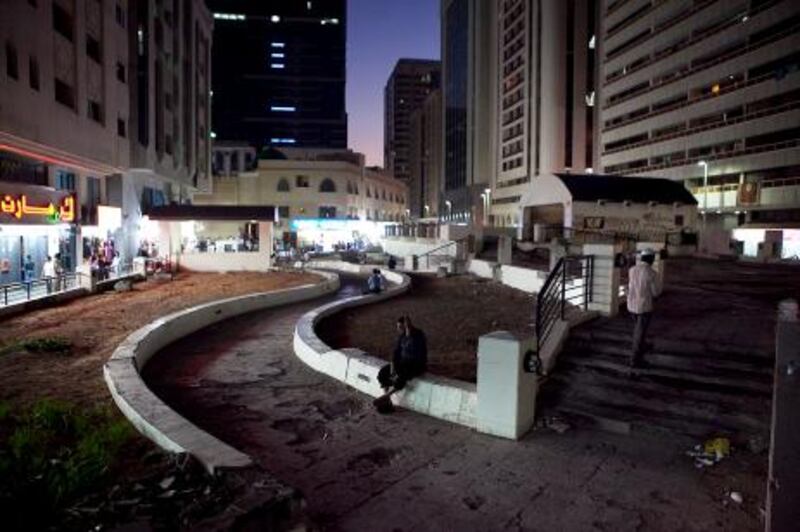ABU DHABI // On an expanse of concrete in the heart of the city, three friends sat on a dusty ledge, talking and laughing.
The men were spending their evening in an empty property surrounded by rubble, rubbish and graffiti.
Hidden off Hamdan Street behind Liwa Centre, the block was once a garden with play areas for children.
It was partly demolished to make way for a dining and entertainment area, but it is now a semi-wasteland tied up in a legal wrangle lasting more than a year, between the former developer and municipality.
"We come here to pass the time," said Abdur Rouf, 52, a Baniyas resident from Bangladesh.
"There's no other place for us," said Mahmoud Renu, 40, also from Bangladesh, who was lounging on the other side of the block-long space. "We just come to drink tea."
There were about 40 other men scattered through an area that has become a de facto public square.
The youngsters who played football and cricket in the area have long since disappeared.
"They said a big company was coming to make a park but they didn't, they left. Now look at it," Mr Renu said. "Maybe they should make it like the Corniche but they don't."
Adel Al Rabeea, the public relations manager for the municipality, said officials could not comment on continuing litigation.
The property is now the responsibility of the Department of Transport (DoT), Mr Al Rabeea said.
The DoT did not respond to requests for comment.
Samir Salloum, a lawyer for the former developer Bonfood, declined to comment on the company's disputes with the municipality, saying only that the lawsuit was filed with the Abu Dhabi Commercial Court.
Ashok Sarasamma, the general manager of Bonfood, said it had planned a dining, retail and entertainment complex called "Bon City".
Two or three years ago, Bonfood began to prepare for construction, sinking about Dh10 million into the project, Mr Sarasamma said.
It took a while to receive the proper licences from the municipality, he said, then the civic body sent a letter telling the company to cease work.
"By the time this happened they handed over all this project to Mawaqif," he said. The agency has a car park under the property.
He said he expected a ruling soon in the court case.
"Of course we're asking for compensation but we don't know what is the decision," Mr Sarasamma said. "Whatever it is, we will accept it."
For now, the property is a quiet spot in a busy neighbourhood, surrounded by apartment towers, a large mosque and shops selling textiles, curries and prayer mats.
"No access" signs are posted on the north-eastern side, where metal barriers block entry. But the south-western half is open to passers-by.
The ground is pocked with potholes. There is rubbish everywhere: paint buckets, torn newspapers, broken glass. But each evening, more than a dozen people linger, chatting, eating, smoking, thinking.
"It's a good area for business. This is Abu Dhabi's main entrance, and we have a big mosque," said Zayed Abdul Jalili, 25, who works in a shop that sells toys and novelties.
After workers demolished the garden, Mr Jalili planted melon seeds.
The fruit has flourished, spreading a patch of green across the sand.
azacharias@thenational.ae






